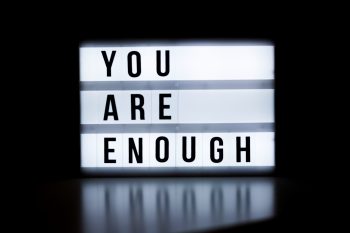If you’re stretching yourself for others at the expense of your own well-being, you might need better boundaries, says Samantha Wood.
“One of the most time- consuming and painful things I’ve had to do since my mom passed away is sort through cupboards (and cupboards) full of her beloved needlework stuff. Recently, I offered 12 neat, colour-ordered boxes full of high-end embroidery thread on a local online community site, free for ‘someone who could make use of them’, and after about 30 seconds had to switch off the comments, as the demand was overwhelming.
The ‘rules’ of such an offer – as with most things – is first come, first served. But just as I was responding to lucky Number One, Number Eight’s words caught my eye: ‘Perhaps it would be nice for you to share them with everyone, Samantha?’
I didn’t want to share them, I wanted someone to collect the lot and swiftly remove this last emotional reminder of death. But suddenly, I felt judged, as if giving them all to just one person would be seen as unkind and not the ‘right’ thing to do.
‘You’re mad,’ said my husband, finding me on the floor in tears after three hours of trying to divide hundreds of shades into equal bundles (because surely it wouldn’t be nice to give someone a box of mainly greys?).

Unsplash
‘Why didn’t you just say no?’ But saying no when someone asks something of you just seems so wrong, doesn’t it? ‘This is a typical case of people- pleasing, which a vast number of women do, as we’ve been raised to believe that if we’re kind, helpful and supportive, we’ll be an asset to society and – perhaps more importantly – we’ll be liked, something that has been vital to our evolution,’ says Coactive Transformation Coach Aisling Gray.
‘Women are also more empathetic than men, so it’s natural for us to want to look after the needs and feelings of others. However, this can quickly become detrimental to our own well-being and opens us up to feelings of overload – and also to being taken advantage of.’
Recent research found that women were more likely than men to describe themselves as people-pleasers and, as a result, are finding that they’re suffering from adverse effects on both their mental and physical health. So, why are we still doing it? Kindness or weakness?
As well as being more empathetic than men (scientifically proven!), Aisling explains that women are more likely to take on caring responsibilities due to cultural expectations and pay inequalities that make it financially more viable for women to step back from their careers to look after children or elderly parents, for example. But often, acts of kindness can snowball, until we can’t – or don’t know how to – stop.

Unsplash
Despite her recently battling breast cancer and working 40 hours a week, I have a friend who is forever picking up other people’s kids, shopping for elderly neighbours, delivering thoughtful care packages and collecting for charity on the high street. She regularly admits to me that she’s wrung out and utterly exhausted, but then she dashes off again, running another errand for someone else.
‘Looking after others can be incredibly rewarding, but there’s a tipping point,’ warns Aisling. ‘Kindness without boundaries leads to depletion and a place where there are no winners.’ Mindset Coach Catherine Baudino agrees, adding that constantly putting the needs of others ahead of our own compromises our authenticity, as we’re not being our true selves; instead we’re being what others expect us to be.
We might even end up going against our core values at times – because saying yes has become easier and more comfortable than saying no.
‘Once you are too used to doing things for others, it becomes difficult to admit that you’re struggling,’ says Catherine. ‘But ignoring or suppressing your own needs can quickly lead to resentment, and you’re likely to end up feeling anger towards the recipients to which you were simply trying to show kindness to in the first place.’

Unsplash
Caring culture
As well as being taught to be kind as children, kindness has become a bit of a mantra in our adult lives too, with popular ‘motivational’ quotes, such as ‘In a world where you can be anything, be kind!’ adding an extra layer of social pressure.
But the idea that we have to be going out of our way to constantly show kindness can add to our mental load, causing feelings of overwhelm, guilt and inadequacy.
‘No one is saying that you need to stop considering people’s feelings or helping others altogether – you can still be kind, but safely within your boundaries,’ says Aisling. ‘Kindness needs to start with yourself, by understanding and honouring your true capacity. By putting your own oxygen mask on first, you’ll be in the best position to give generously and fully to others.’
You’re giving too much if you:
- Want to help people out so they like you.
- Feel exhausted, overstretched or burnt out.
- Are starting to feel used.
- Feel angry or resentful when people ask for something.
- Notice that doing things for others is affecting your physical or mental health

Unsplash
Show compassion the healthy way
Consider what motivates you
How does the level of kindness that you’re showing to others really serve you? If the act itself fills your cup, carry on. But if you’re trying to please someone else, you’re wanting to be liked or validating yourself in some way, then take some time to reflect on why.
‘People-pleasing goes beyond simple kindness, because at its core we are editing our own lives for the sake of someone else’s feelings, which can erode our self-esteem, confidence and ability to show up fully in the world,’ says Sobriety Coach Gill McKay. ‘The first step in truly being kind to others is learning to be kind to yourself, and simple boundary setting is the ultimate act of self-care.’
Check your energy levels
Work out what you’re happy to have more of in your life. ‘Take a piece of paper and draw a line down the middle. On one side, write all the “energy giving” things that make you feel safe, comforted, happy – maybe that’s baking for people, dog-sitting or helping out with shopping,’ suggests Aisling.
On the other side, list the ‘energy sapping’ things that leave you feeling angry, sad and used. ‘The key is to deliberately give more to the energy-giving actions or people, and less to what’s draining you. Once you have this list of non-negotiables, you won’t be faced with making decisions on the spot when someone asks something of you.’
Begin boundary setting
‘If you say “yes” even if it compromises your own values, setting boundaries will change your life for the better,’ promises Aisling. For example, if you have an energy-sapping colleague who complains about their partner every time you go for lunch, setting a boundary might look like kindly saying, ‘I don’t know how I can help with this – have you tried the Relate website?’
Accepting that we are not responsible for other people’s actions or feelings is a huge step. ‘Remember, we cannot fix or control another person’s response. This is determined by their own life experience,’ adds Aisling.
Retrain your brain
Consider who you need to start saying no to – your list can help with this. ‘Say it out loud to yourself, a bit like you’re learning lines, and then when you come to deliver the words, they’ll feel more comfortable,’ says Psychology Professor Dr Kim Gorgens.
Take note of how you speak, as we might naturally feel like laughing or adding a question mark after a statement, discrediting our power and diluting our message, says Dr Gorgens. ‘The more you practise, the more prepared you will be to deliver a clear no.’
Just say no
This is the tough one; actually saying no. You might feel prepared to jump in head first with a colleague or a family member, or start smaller with someone you don’t know as well to build your confidence, but ‘both approaches have the same outcome, so go for what feels the most comfortable,’ says Dr Gorgens.
‘You might find that it’s easier than you expected and, after that, a little easier each time.’ Your perseverance will pay off. Once you – and others – are aware of your clear boundaries, you’ll feel empowered, fulfilled and healthier. Being kind will then truly feel good again.
ALSO SEE:
Feature Image: Unsplash

